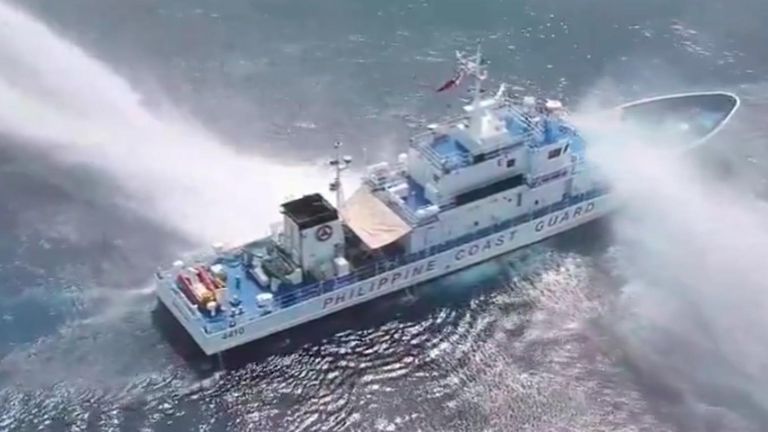China and the Philippines have reached a deal they hope will end confrontations over a disputed territory in the South China Sea.
The Philippines occupies the Second Thomas Shoal, which is also claimed by Beijing.
The years-long territorial stand-off has flared repeatedly since last year – with increasingly hostile confrontations sparking fears of a larger conflict that could involve the US.
Chinese coastguard and other forces have used powerful water cannons and dangerous blocking manoeuvres to prevent the Philippines from delivering food and other supplies to navy personnel in its outpost in the shallows of the shoal.
A deal to end confrontations was reached on Sunday after a series of meetings between officials from both countries in the Philippine capital Manila.
The Philippines foreign ministry said the two countries have “reached an understanding on the provisional arrangement” for resupply missions to the outpost.
The ministry added: “Both sides continue to recognise the need to de-escalate the situation in the South China Sea and manage differences through dialogue and consultation and agree that the agreement will not prejudice each other’s positions in the South China Sea.”
The deal was reached without either of the countries conceding the other side’s territorial claims.
Beijing has disputes with several governments over land and sea borders, many of them in the South China Sea.
Sunday’s deal could spark hope that similar arrangements could be forged by China with other rival countries to avoid clashes while thorny territorial issues remain unresolved.
It remains to be seen, however, if the deal could be implemented successfully and how long it will last.
What clashes have taken place?
The Philippines outpost is on a long-grounded and rusting warship called the BRP Sierra Madre.
In the worst confrontation, Chinese forces on motorboats repeatedly rammed and then boarded two navy boats, which were transferring food and other supplies on 17 June, according to the Philippine government.
The Chinese forces were also said to have seized the Philippine navy boats and damaged them with machetes and improvised spears.
They also reportedly seized seven M4 rifles, which were packed in cases, and other supplies.
Read more:
Sky News witnesses confrontation in South China Sea
Why has the South China Sea become so contentious?
A Philippine military chief said soldiers used their “bare hands” to fight off armed Chinese coastguard.
Several navy personnel were wounded, including one who lost his thumb, in a chaotic skirmish that was captured in video and photos that were later made public by Philippine officials.
China and the Philippines blamed each other for the confrontation and each asserted their own sovereign rights over the shoal, which Filipinos call Ayungin and the Chinese call Ren’ai Jiao.
The US and its key Asian and Western allies, including Japan and Australia, condemned the Chinese acts at the shoal.
They also called for the rule of law and freedom of navigation to be upheld in the South China Sea, a key global trade route with rich fishing areas and undersea gas deposits.
Washington has no territorial claims in the disputed waters but has repeatedly warned that it is obligated to defend the Philippines, its oldest treaty ally in Asia, if Filipino forces, ships and aircraft come under an armed attack.





